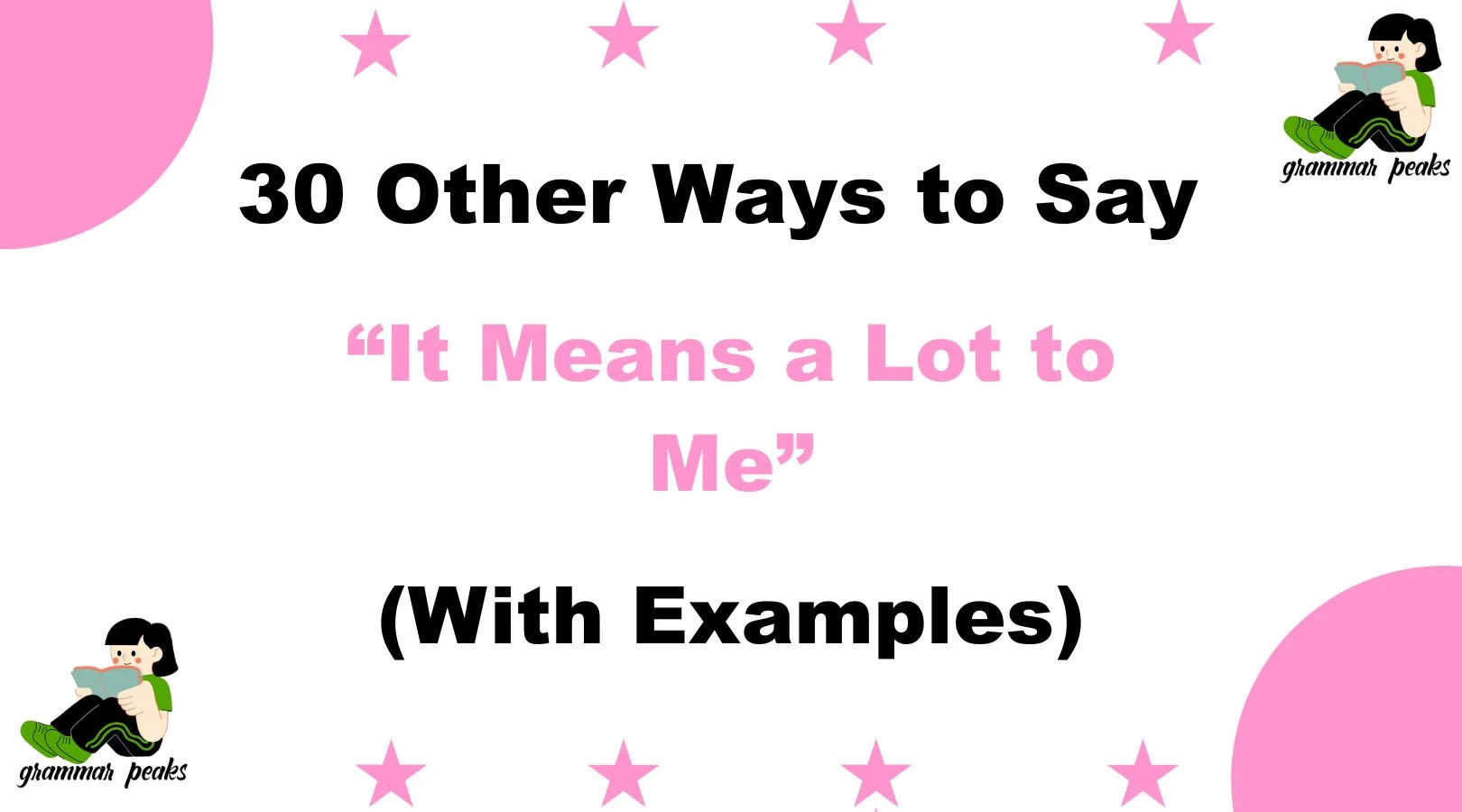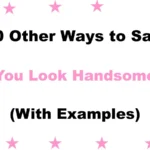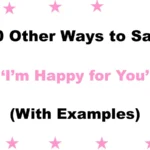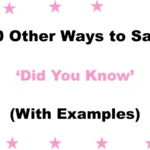Expressing genuine feelings can sometimes feel tricky. Finding the right words to show someone that their actions or words truly matter is important. Saying “It means a lot to me” is a heartfelt phrase, but mixing it up with meaningful alternatives can make your message feel even more personal and thoughtful.
Whether you want to convey deep gratitude, appreciation, or emotional significance, having a variety of expressions at hand can help you communicate with warmth and care. In this article, you’ll discover 30 beautiful alternatives to say “It means a lot to me,” along with clear explanations, examples, and tips on when and how to use them effectively.
What Does “It Means a Lot to Me” Mean?
“It means a lot to me” is a phrase used to express that something holds significant personal value or emotional importance. When you say this, you’re telling someone that their gesture, words, or actions have deeply affected you in a positive way.
This phrase communicates gratitude, appreciation, and a sense of being touched or moved. It’s often used in situations involving kindness, support, or meaningful moments shared with others.
When to Use “It Means a Lot to Me”
Use “It means a lot to me” in personal conversations when you want to highlight the emotional impact of someone’s actions or words. This phrase fits well in situations like receiving help, support, compliments, or encouragement.
It helps to build a stronger connection by showing vulnerability and thankfulness. It is suitable in both casual and semi-formal settings but might need a more professional alternative in strictly business environments.
Is It Professional/Polite to Say “It Means a Lot to Me”?
Yes, “It means a lot to me” is polite and often professional enough, especially in settings that encourage genuine emotional expression, such as team appreciation or client relationships. However, in highly formal or corporate environments, you might want to choose alternatives that sound more polished, like “I sincerely appreciate this” or “Your support is greatly valued.”
Pros and Cons of Using “It Means a Lot to Me”
Pros:
- Clearly expresses emotional significance.
- Builds warmth and trust in relationships.
- Simple and easy to understand.
Cons:
- Can sound repetitive if overused.
- Might feel too casual for very formal situations.
- Sometimes it lacks specificity compared to other expressions.
Synonyms for “It Means a Lot to Me”
- I truly appreciate it
- That really touches my heart
- I’m deeply grateful
- It holds great significance for me
- I can’t thank you enough
- This means the world to me
- I’m sincerely thankful
- It’s very important to me
- I’m moved by this
- Your kindness means so much
- It’s deeply meaningful to me
- I’m overwhelmed with gratitude
- This really hits home
- I feel truly blessed
- Your support is invaluable
- I’m profoundly touched
- It’s a heartfelt gift
- I’m eternally grateful
- This resonates with me
- I appreciate it more than words can say
- It’s a precious gesture
- I’m thankful from the bottom of my heart
- This has great emotional value
- I’m sincerely moved
- Your gesture means everything to me
- It’s incredibly meaningful
- I’m truly honored
- I’m filled with appreciation
- It leaves a lasting impact on me
- I’m grateful beyond words
1. I Truly Appreciate It
Definition: An expression of sincere thanks, showing you value someone’s effort or kindness.
Detailed Explanation: This phrase conveys heartfelt gratitude, emphasizing that the person’s action is recognized and valued.
Scenario Example: “Thank you for helping me prepare for the interview. I truly appreciate it.”
Best Use: Casual or formal conversations where you want to express gratitude clearly.
Worst Use: Overuse may reduce impact; avoid overly formal reports.
Tone: Warm, sincere, and polite.
2. That Really Touches My Heart
Definition: Expresses that something emotionally affects or moves you deeply.
Detailed Explanation: Shows a personal emotional response, indicating that the gesture or words have left a meaningful impression.
Scenario Example: “Your thoughtful message really touches my heart.”
Best Use: Personal letters, thank-you notes, or conversations with close friends.
Worst Use: Formal business contexts where emotional language might be seen as unprofessional.
Tone: Emotional, genuine, intimate.
3. I’m Deeply Grateful
Definition: Indicates a profound sense of thankfulness.
Detailed Explanation: Suggests that your gratitude goes beyond surface-level appreciation and is deeply felt.
Scenario Example: “I’m deeply grateful for your support during this challenging time.”
Best Use: Situations requiring serious, respectful expression of thanks.
Worst Use: Casual conversations where simpler expressions might be preferable.
Tone: Respectful, earnest, serious.
4. It Holds Great Significance for Me
Definition: Conveys that something is very important or meaningful personally.
Detailed Explanation: Emphasizes the personal value or importance attached to an action or event.
Scenario Example: “Your encouragement holds great significance for me as I start my new job.”
Best Use: When you want to highlight importance thoughtfully.
Worst Use: Informal chats where this may sound too formal.
Tone: Reflective, thoughtful, respectful.
5. I Can’t Thank You Enough
Definition: Expresses that simple thanks are insufficient to convey your gratitude.
Detailed Explanation: Indicates overwhelming appreciation that words alone cannot fully capture.
Scenario Example: “After everything you did to help, I can’t thank you enough.”
Best Use: To express deep gratitude in meaningful moments.
Worst Use: Avoid if used too often; it can sound exaggerated.
Tone: Emphatic, heartfelt, sincere.
6. This Means the World to Me
Definition: Shows that something has immense personal value.
Detailed Explanation: A popular, heartfelt phrase communicating that an act or words are extremely important to you.
Scenario Example: “Your surprise visit means the world to me.”
Best Use: Personal, warm situations like friendships and family.
Worst Use: Very formal or corporate contexts.
Tone: Warm, affectionate, genuine.
7. I’m Sincerely Thankful
Definition: A straightforward, earnest expression of gratitude.
Detailed Explanation: Indicates honest appreciation without exaggeration.
Scenario Example: “I’m sincerely thankful for your advice.”
Best Use: Both casual and professional settings where genuine thanks are appropriate.
Worst Use: Avoid overly casual remarks where a lighter tone is better.
Tone: Honest, polite, formal.
8. It’s Very Important to Me
Definition: A direct statement highlighting the importance of something.
Detailed Explanation: States that the thing or gesture carries personal value or priority.
Scenario Example: “Your feedback is very important to me.”
Best Use: Professional and personal situations where clarity is needed.
Worst Use: May sound blunt in highly emotional contexts.
Tone: Clear, straightforward, respectful.
9. I’m Moved by This
Definition: Indicates that something has affected you emotionally.
Detailed Explanation: Communicates a feeling of being touched or emotionally stirred.
Scenario Example: “I’m truly moved by your generosity.”
Best Use: Expressing emotion in personal or formal thanks.
Worst Use: Overused phrases may lose impact.
Tone: Emotional, respectful, genuine.
10. Your Kindness Means So Much
Definition: Focuses on the value of the kindness shown.
Detailed Explanation: Highlights that the caring nature of an act is especially appreciated.
Scenario Example: “Your kindness during this time means so much.”
Best Use: Personal interactions where warmth is key.
Worst Use: Formal business communication where emotions are kept minimal.
Tone: Warm, heartfelt, appreciative.
11. It’s Deeply Meaningful to Me
Definition: Indicates profound personal importance.
Detailed Explanation: Suggests a connection that resonates emotionally.
Scenario Example: “This award is deeply meaningful to me.”
Best Use: Situations where emotional depth is appropriate.
Worst Use: Casual remarks that may seem too heavy.
Tone: Thoughtful, sincere, respectful.
12. I’m Overwhelmed with Gratitude
Definition: Expresses an intense feeling of thankfulness.
Detailed Explanation: Suggests that your appreciation is so strong it almost overwhelms you.
Scenario Example: “I’m overwhelmed with gratitude for your help.”
Best Use: Moments of significant support or kindness.
Worst Use: Avoid small, everyday favors.
Tone: Intense, emotional, sincere.
13. This Really Hits Home
Definition: Conveys that something resonates on a deep personal level.
Detailed Explanation: Implies that the impact is profound and relatable.
Scenario Example: “Your words really hit home during a tough time.”
Best Use: Personal conversations involving empathy.
Worst Use: Formal contexts where casual idioms may seem unprofessional.
Tone: Informal, empathetic, sincere.
14. I Feel Truly Blessed
Definition: Expresses gratitude with a sense of being fortunate.
Detailed Explanation: Adds a spiritual or heartfelt dimension to thankfulness.
Scenario Example: “I feel truly blessed to have you in my life.”
Best Use: Personal and heartfelt moments.
Worst Use: Professional environments unless appropriate.
Tone: Warm, humble, sincere.
15. Your Support Is Invaluable
Definition: Highlights the irreplaceable value of someone’s support.
Detailed Explanation: Communicates that the help or encouragement is essential and highly appreciated.
Scenario Example: “Your support during this project is invaluable.”
Best Use: Professional and personal situations.
Worst Use: Avoid if it feels overly formal or insincere.
Tone: Respectful, professional, warm.
16. I’m Profoundly Touched
Definition: Shows deep emotional impact.
Detailed Explanation: Implies a sincere and heartfelt emotional response.
Scenario Example: “I’m profoundly touched by your thoughtful gesture.”
Best Use: Personal, meaningful occasions.
Worst Use: Casual chats where it may seem too formal.
Tone: Serious, emotional, respectful.
17. It’s a Heartfelt Gift
Definition: Describes an act or thing given with genuine emotion.
Detailed Explanation: Recognizes the sincerity behind a gesture.
Scenario Example: “Your advice was a heartfelt gift.”
Best Use: Personal acknowledgments.
Worst Use: Formal business documents.
Tone: Warm, appreciative, genuine.
18. I’m Eternally Grateful
Definition: Expresses gratitude that will last forever.
Detailed Explanation: Suggests long-lasting thankfulness.
Scenario Example: “I’m eternally grateful for your guidance.”
Best Use: Very meaningful, impactful moments.
Worst Use: Casual or small favors.
Tone: Dramatic, heartfelt, sincere.
19. This Resonates with Me
Definition: Indicates that something strongly connects with your feelings or beliefs.
Detailed Explanation: Shows deep personal relevance.
Scenario Example: “Your story really resonates with me.”
Best Use: When sharing personal or emotional connections.
Worst Use: Formal business emails.
Tone: Thoughtful, reflective, sincere.
20. I Appreciate It More Than Words Can Say
Definition: Emphasizes the limits of verbal gratitude.
Detailed Explanation: Suggests that your thankfulness is beyond what language can express.
Scenario Example: “I appreciate your help more than words can say.”
Best Use: Deeply thankful moments.
Worst Use: Casual conversations.
Tone: Emotional, sincere, heartfelt.
21. It’s a Precious Gesture
Definition: Recognizes the value of an act as rare and special.
Detailed Explanation: Focuses on the meaningfulness of the action.
Scenario Example: “Your thoughtful note was a precious gesture.”
Best Use: Personal thanks.
Worst Use: Business contexts.
Tone: Warm, sincere, appreciative.
22. I’m Thankful from the Bottom of My Heart
Definition: An expression of deep, heartfelt gratitude.
Detailed Explanation: Suggests a sincere and full emotional thankfulness.
Scenario Example: “Thank you from the bottom of my heart for your support.”
Best Use: Personal, emotional moments.
Worst Use: Overused in casual speech.
Tone: Warm, sincere, emotional.
23. This Has Great Emotional Value
Definition: States that something is emotionally important.
Detailed Explanation: Focuses on the personal emotional significance.
Scenario Example: “Your words have great emotional value to me.”
Best Use: Thoughtful, personal communication.
Worst Use: Formal business environments.
Tone: Reflective, sincere, respectful.
24. I’m Sincerely Moved
Definition: Indicates genuine emotional impact.
Detailed Explanation: Shows honest and heartfelt response.
Scenario Example: “I’m sincerely moved by your generosity.”
Best Use: Personal and formal occasions.
Worst Use: Casual remarks.
Tone: Respectful, emotional, genuine.
25. Your Gesture Means Everything to Me
Definition: Expresses the utmost importance of an action.
Detailed Explanation: Indicates that the gesture is highly valued.
Scenario Example: “Your help means everything to me during this difficult time.”
Best Use: Emotional or important situations.
Worst Use: Overuse can reduce impact.
Tone: Emotional, sincere, warm.
26. It’s Incredibly Meaningful
Definition: Highlights strong personal importance.
Detailed Explanation: Suggests a deep and significant impact.
Scenario Example: “This gift is incredibly meaningful to me.”
Best Use: Personal, heartfelt thanks.
Worst Use: Overused in casual settings.
Tone: Warm, appreciative, sincere.
27. I’m Truly Honored
Definition: Expresses respect and gratitude for a special acknowledgment.
Detailed Explanation: Suggests pride and thankfulness.
Scenario Example: “I’m truly honored to receive this award.”
Best Use: Formal recognition and appreciation.
Worst Use: Casual thanks.
Tone: Formal, respectful, sincere.
28. I’m Filled with Appreciation
Definition: Indicates being full of grateful feelings.
Detailed Explanation: Emphasizes a strong emotional state of thanks.
Scenario Example: “I’m filled with appreciation for your continuous help.”
Best Use: Thoughtful acknowledgments.
Worst Use: Overuse in casual contexts.
Tone: Warm, sincere, emotional.
29. It Leaves a Lasting Impact on Me
Definition: Suggests long-term emotional or personal effect.
Detailed Explanation: Indicates that the act or words will be remembered and valued.
Scenario Example: “Your advice leaves a lasting impact on me.”
Best Use: Emotional or serious situations.
Worst Use: Casual conversations.
Tone: Thoughtful, sincere, respectful.
30. I’m Grateful Beyond Words
Definition: Expresses gratitude so deep it’s hard to put into words.
Detailed Explanation: Emphasizes the intensity of appreciation.
Scenario Example: “I’m grateful beyond words for your help.”
Best Use: Moments of profound thankfulness.
Worst Use: Casual use.
Tone: Emotional, sincere, heartfelt.
Conclusion
Expressing that something means a lot to you is a powerful way to connect with others through gratitude and emotional honesty. The alternatives shared here offer various shades of warmth, sincerity, and respect, enabling you to choose the perfect phrase depending on the occasion, relationship, and tone you want to convey.
Whether in casual chats or formal acknowledgments, these expressions help deepen your communication by showing authentic appreciation. Remember, the best phrase is one that feels true to your heart and fits naturally in the moment. Using these alternatives thoughtfully can strengthen bonds and make your words truly meaningful.
FAQs
1.What does “It means a lot to me” actually imply?
“It means a lot to me” implies that something holds deep personal value or emotional importance to you. It’s a way to express genuine gratitude or affection, showing someone that their actions or words have touched you in a meaningful and positive way.
2.Is it okay to say “It means a lot to me” in professional settings?
Yes, but with caution. While the phrase is polite and kind, it may sound too emotional or casual in very formal business communication. In professional contexts, it’s often better to use alternatives like “I truly appreciate it” or “Your support is greatly valued.”
3.What are the most heartfelt alternatives to “It means a lot to me”?
Some of the most heartfelt alternatives include:
- “I’m deeply grateful”
- “This means the world to me”
- “I’m thankful from the bottom of my heart”
- “I’m moved by this”
These options convey deep emotion and are suitable for situations involving personal gratitude or strong feelings.
4.How can I make my gratitude sound more unique or personal?
To make your gratitude sound more authentic, try to be specific. Mention what the person did and how it affected you. Pair your thanks with phrases like:
- “Your advice really hit home.”
- “That gift was a heartfelt gesture.”
- “Your support during this difficult time was invaluable.”
Personalizing your message helps it feel more meaningful and memorable.
5.Can overusing emotional phrases like these reduce their impact?
Yes. Like many heartfelt expressions, repetition can dilute their power. Use these alternatives when you truly feel them, and vary your language to keep your communication fresh and sincere. Using the right tone for the right moment helps preserve the authenticity of your message.

Mia Rose is a passionate Language Coach and Contributor at GrammarPeaks, where she specializes in practical grammar tips and language learning strategies. With a strong foundation in education and communication, Mia brings a friendly, approachable style to her writing. Her goal is to make complex grammar rules simple and usable for learners at any level, helping them grow in both confidence and fluency.





